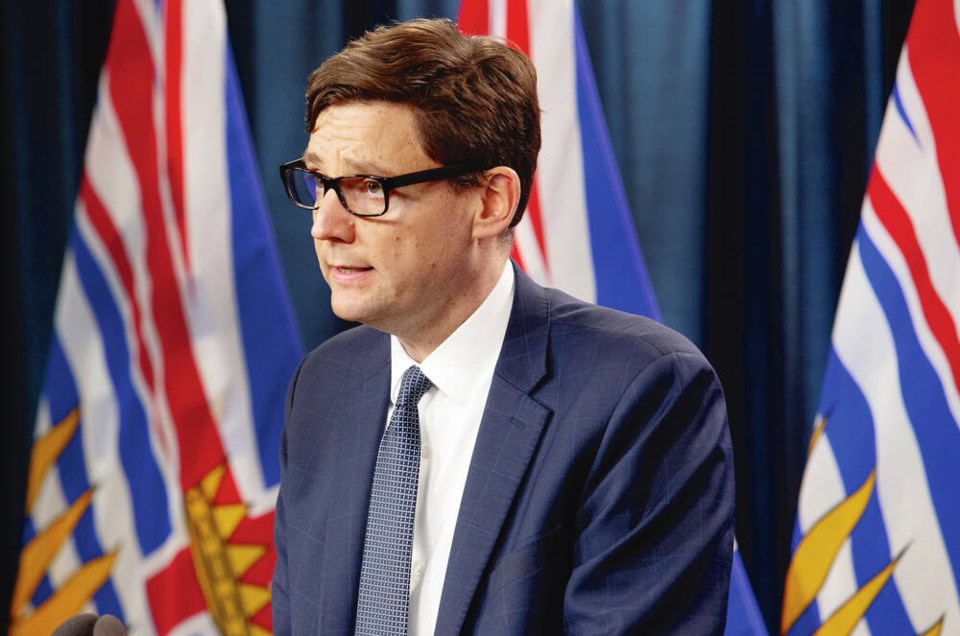With David Eby giving up his cabinet posts so he can run for the leadership of the provincial New Democrats, two of his recent statements merit a closer look.
On June 30, Eby announced the addition of five new members to the board of B.C. Housing. He explained that in the wake of a blistering review by the consulting firm Ernst and Young, the Crown corporation’s board needed strengthening.
But then just eight days later, in a late Friday night statement, Eby announced the departure of the original board members in language that suggested they’d been let go. This wasn’t a strengthening of the board. It was an evisceration.
So what’s going on? Why the unceremonious dismissals just a week after the minister sang quite a different song?
There is an echo here of Alice in Wonderland, from ”curiouser and curiouser” to “off with their heads.”
The Ernst and Young review was, beyond any doubt, blistering.
The company found that B.C. Housing has failed to invest in adequate IT infrastructure, “resulting in disparate systems that are not meeting the needs of the functional areas.”
As well, “project administration processes are largely undocumented.”
There is duplication in the organizational structure and lack of clarity in accountabilities.
The corporation has failed to put in place a formal data management process, and the internal structure is built around silos, both at the strategic and day-to-day levels.
And this: “B.C. Housing delivers 80-85% of services through non-profit housing providers. … Current oversight processes for these providers are manual in nature with limited ability to objectively assess provider performance … and manage overall risk.”
Lastly, the consultants pointed to layers of intermediary committees and “shareholders” who stand between the minister and the board, and whose competing agendas must somehow be accommodated in any forward plan.
This is not a model of efficient governance. At best it distracts staff from their proper duties, and at worst it renders every decision the subject of interminable second-guessing.
In short, B.C. Housing is in no position to manage the historic 10-year, $7-billion investment in affordable housing the government has committed.
Eby was housing minister for the better part of two years.
Why was an external consultant required, at a cost of $730,000, to tell the minister what he and the corporation’s board should already have known?
And what about the management team? In 2021 the CEO took home $394,357 in total compensation. There are four vice-presidents whose compensation, in total, approaches $1 million.
What have they all to say?
To put it mildly, none of this reflects well on Eby’s oversight. Nor does it reflect well on the arrangement in which Eby was both attorney general and housing minister. Either of those jobs would keep any minister busy.
But most troubling: What confidence may we have that a corporate ship taking in water can play the lead role in tackling our housing crisis?
Long after the COVID epidemic and soaring inflation rates have hopefully resolved themselves, unaffordable housing will remain one of the main challenges facing any B.C. government.
We need more than a shake-up of the board. We also need to know that the minister in charge is sufficiently engaged, on a day-to-day basis, to ensure that the necessary improvements are being put in place.
Eby had two major cabinet posts — and both of those portfolios have been turned over to Murray Rankin, who will continue as minister of Indigenous relations and reconciliation.
That’s one person where we should have three. This is not a reasonable arrangement.
Barring an unforseeable turn of events, Eby will be the next premier. Let’s hope that he will assign cabinet responsibilities in a more realistic fashion.
Among the changes, we need a housing minister who does not have the distraction of other pressing duties.
The report on B.C. Housing is a good reminder that a vital matter such as housing policy cannot be an afterthought.
>>> To comment on this article, write a letter to the editor: [email protected]



